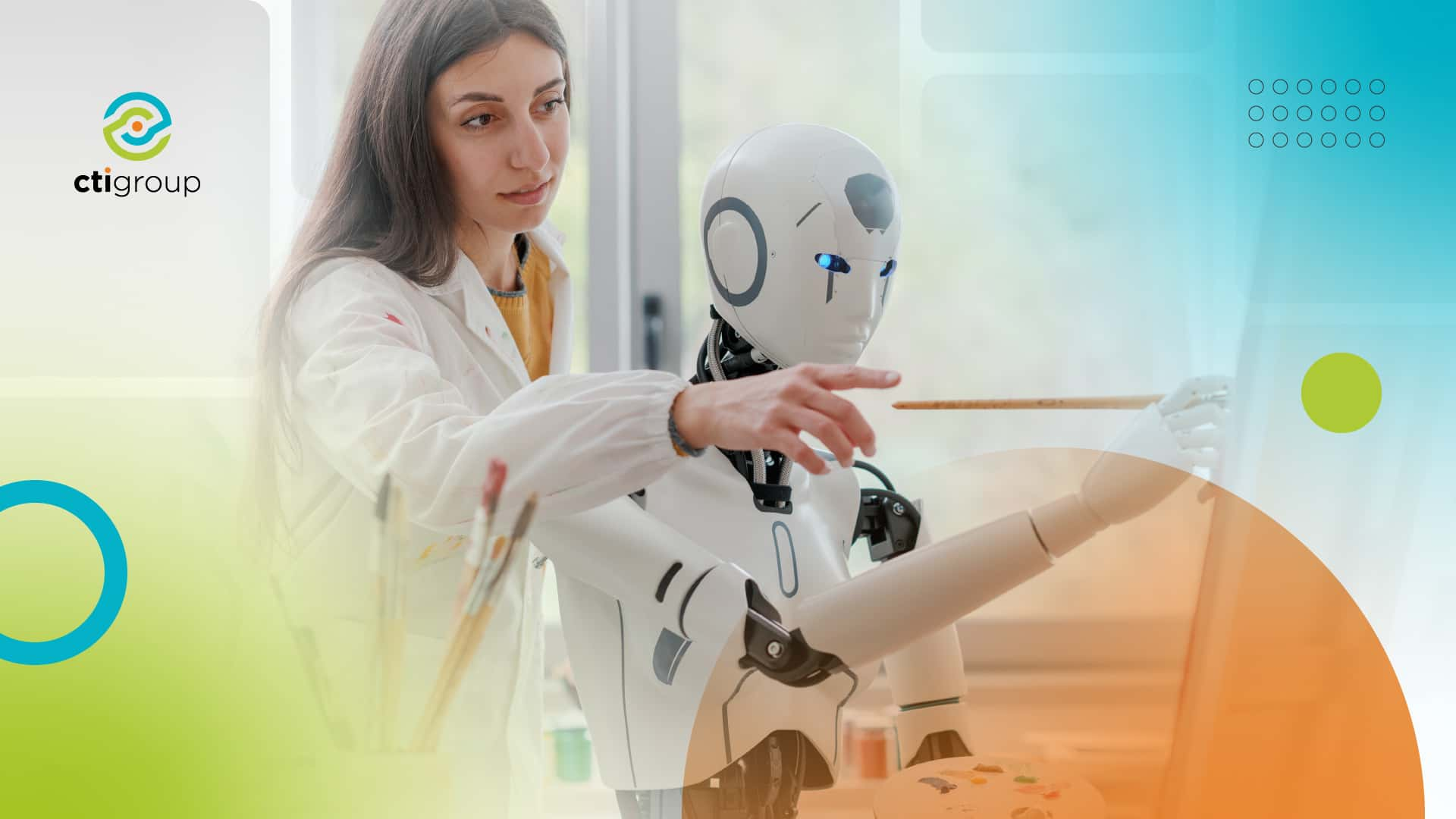Generative AI is gaining momentum in the business world for its ability to transform business operations, from simplifying complex tasks to increasing efficiency. This technology is at the forefront of innovation. However, to fully harness its potential, businesses must address strategic challenges and ethical considerations.
Let’s dive deep into its definition, benefits, applications, and challenges to understand how it can transform modern business operations.
What is Generative AI?
Generative AI is an artificial intelligence (AI)-based technology designed to create new content such as text, images, audio, and video. This technology mimics the human creative process by using available data and user instructions to generate relevant and innovative output.
Today, Generative AI is widely used in a variety of industries, including marketing, product development, and customer service. This technology helps accelerate workflows while providing innovative solutions that support both efficiency and creativity.
How has Generative AI Evolved?
The development of Generative AI began in the 1960s when traditional AI technologies were used for tasks such as speech recognition and data management. Over time, this technology evolved with the introduction of sophisticated neural network-based models, such as Generative Adversarial Networks (GANs).
Today, Generative AI has evolved significantly and has become a focal point, especially with models such as GPT (Generative Pre-trained Transformer). This technology supports a wide range of applications, from creative content creation to supporting scientific research.
What’s the Difference Between Generative AI and Traditional AI?
Generative AI differs from traditional AI, which is generally designed to analyze or classify data. Traditional AI focuses on specific tasks, such as prediction or pattern recognition. Generative AI, on the other hand, is designed to create new content, allowing users to generate novel works based on specific instructions or prompts. This technology uses deep learning models, such as transformers and GPT, which can produce outputs that resemble human-created works, such as articles, images, or product designs.
3 Key Technologies Behind Generative AI
There are three main technologies that support the power of Generative AI.
- Neural Networks
This technology serves as the foundation for understanding and processing patterns in complex data, enabling AI to learn from large data sets.
- Transformational Models
These models analyze large amounts of data and generate accurate and relevant content. For example, GPT is used to generate text with natural structure and style.
- Reinforcement Learning
This technology improves the quality of output by using human feedback or specific outcomes, as seen in models such as ChatGPT.
What are the Benefits of Generative AI for Modern Businesses?

Generative AI brings a number of benefits to modern businesses, from enhancing operational efficiency to delivering more personalized customer experiences. Here are its four key benefits.
1. Increased Productivity and Efficiency
Generative AI can automate repetitive tasks, speeding up workflows and allowing teams to focus on strategic work. For example, automated content generation and big data analysis can be done much faster, not only improving efficiency but also accelerating decision-making.
2. Personalize Customer Interactions
With its advanced data analysis capabilities, Generative AI can create a more personalized customer experience. With this technology, companies can tailor marketing campaigns to user preferences and provide product or service recommendations that meet individual needs, even at scale.
3. Cost Reduction through Smart Automation
Generative AI’s automation capabilities help streamline processes and reduce reliance on manual labor. In product development or logistics planning, this technology provides more efficient solutions, minimizes errors, and improves outcomes, resulting in significant operational cost savings.
Examples of Generative AI Applications to Improve Business Efficiency
With its vast potential, Generative AI can bring significant change to businesses. Two of its key applications are automating routine tasks and redefining how companies deliver customer service.
Automating Tasks with Gleematic.AI
Gleematic.AI helps companies automate routine tasks such as data processing and report generation. This increases operational efficiency, reduces human error, and allows businesses to focus on more strategic, value-added tasks.
Transform Customer Service with Kouventa
Kouventa provides conversational AI tools to improve business-to-customer interactions. These tools automatically respond to customer queries and learn from previous interactions, providing faster and more personalized service.
Also Read: 5 Technologies for Business to Boost Digital Transformation
Challenges and Considerations in Implementing Generative AI

Implementing Generative AI presents several technical and practical challenges that must be addressed. These include.
Ethical Issues in Using Generative AI
Generative AI can produce highly creative content, but this raises ethical concerns related to content ownership, the use of personal data, and the impact on human employment. For example, AI-generated content may replicate or adapt existing works, raising issues of copyright and originality. Therefore, it is important to establish ethical guidelines to ensure that AI is used responsibly and does not harm others.
The Importance of Protecting Data Privacy and Security
The use of big data to train AI models can pose privacy risks if sensitive data is not managed properly. Companies must implement strict security measures to protect customer data from potential breaches and ensure that personal information is not misused.
Scalability Challenges in Implementing Generative AI
Scalability is a critical factor in deploying Generative AI within an enterprise. AI solutions must be able to scale as the business grows, both in terms of data volume and task complexity. Businesses need to ensure that systems are flexible enough to handle increasing workloads without compromising performance or quality. These systems should also be able to integrate new technologies and adapt to changing market demands.
The Future Evolution of Generative AI in the Coming Years
Generative AI is expected to continue to evolve significantly, driven by technological advancements and increasing adoption across multiple industries. Here are some of the expected developments.
Industry Transformation
This technology will transform the way various industries operate, from creating more personalized and engaging campaigns to assisting in drug development and analyzing patient data.
Improved Quality and Accuracy
With more advanced algorithms, Generative AI will produce more relevant and accurate content. This opens new opportunities for AI applications that require high levels of accuracy, such as data analysis and decision making.
Ethical and Regulatory Challenges
Data privacy and content responsibility will be major concerns, with the possibility of stricter regulations to ensure that the use of Generative AI does not harm individuals or society.
Human-Machine Collaboration
Generative AI will serve as an assistant rather than replacing human roles, enhancing creativity and productivity. Workers in various fields will be able to use AI’s capabilities to generate new ideas and complete tasks more efficiently.
Technology Accessibility
Access to this technology will become more widespread, making it easier for businesses of all sizes to benefit from it. This will also encourage innovation across different sectors, allowing more people to participate in the development of AI-based solutions.
Unlock the Full Potential of Generative AI with CTI Group Solutions
Generative AI offers tremendous potential for businesses, but its use must be coupled with responsible management of ethics and security to fully realize its benefits.
CTI Group and our subsidiaries provide customized technology solutions to meet the unique needs of each organization, from software to cloud infrastructure. As a trusted IT partner in Southeast Asia, we help businesses adopt Generative AI securely, efficiently, and flexibly.
Increase productivity, protect data, and drive innovation with CTI Group. Contact us through this link to discover solutions that fit your business!
Author: Wilsa Azmalia Putri – Content Writer CTI Group

